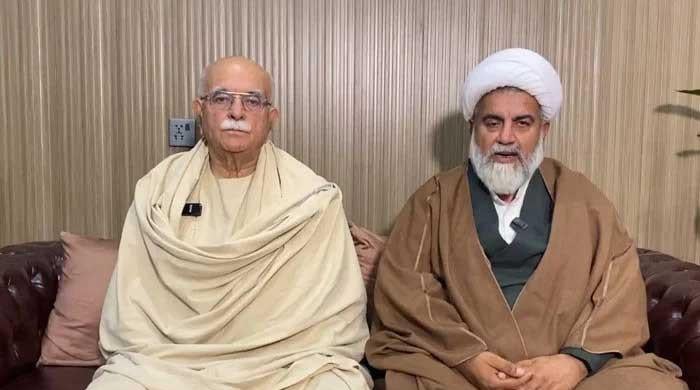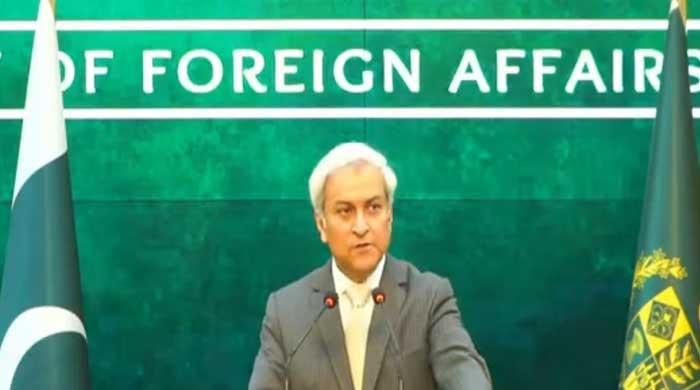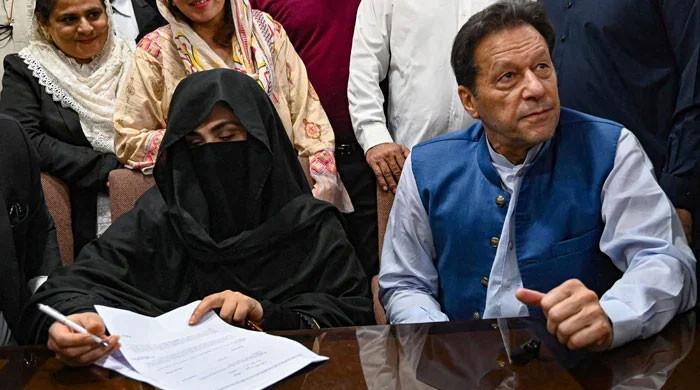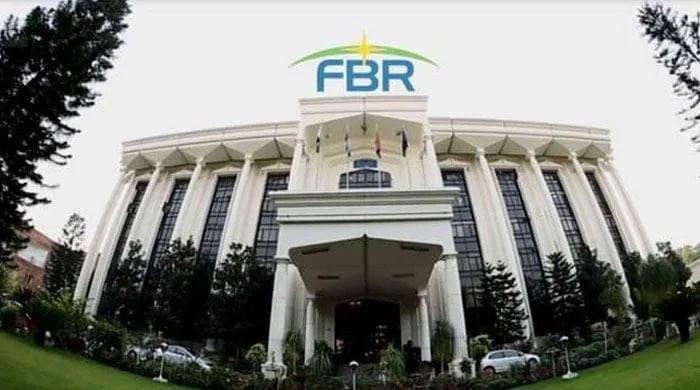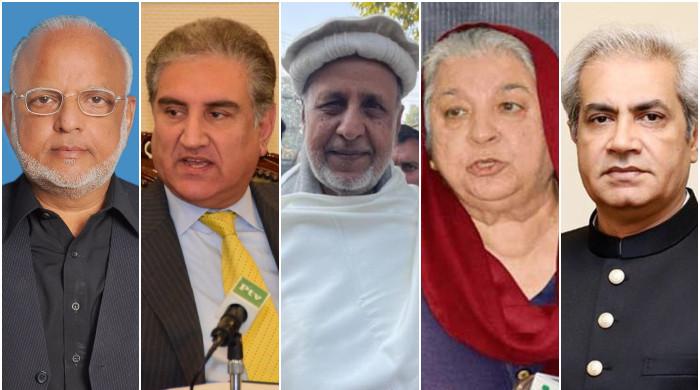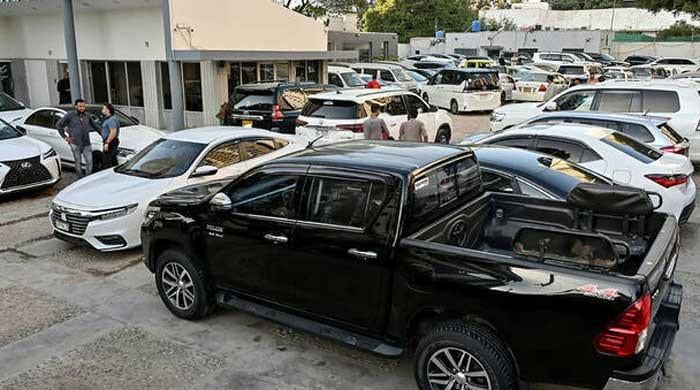EVM can open up possibility of 'more sophisticated fraud': ECP in letter to Senate committee chairman
EVMs are presented as a solution to rigging in the elections, but they "cannot counter all types of fraud", ECP says
September 10, 2021
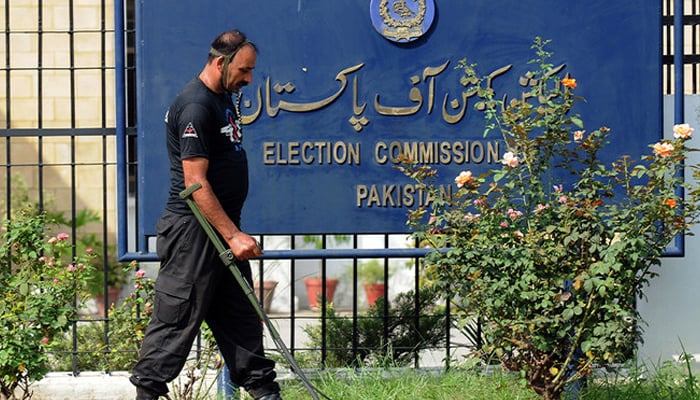
- ECP says EVMs "cannot counter all types of fraud".
- There will be lack of evidence in case of election disputes: ECP.
- 900,000 machines would be required; system will cost approximately Rs150 billion: ECP
ISLAMABAD: The electronic voting machine (EVM) can open up the possibility of "more sophisticated fraud" through the manipulation of software and hardware, the Election Commission of Pakistan (ECP) has said.
EVMs are presented as a solution to rigging in the elections, but they "cannot counter all types of fraud", the ECP said, in a 34-point letter sent to Chairman Senate Standing Committee on Parliamentary Affairs Taj Haider on Friday, September 9.
The ECP sent the letter to the standing committee chairman as it continues to be at loggerheads with the government over the use of the machines during the elections, with the Centre stressing that EVMs can ensure transparency.
The ECP said there would be a "lack of evidence in case of election disputes", as it underscored that the compatibility of EVMs with the existing constitutional and legal framework should be considered.
"Many more amendments are required as still many sections are relevant to only physical voting. This needs further deliberations," the ECP told the standing committee's chairman.
The election commission further pointed out that voting machines were not the answer to rigging as they could not stop electoral frauds and other issues that arise during polling.
"The machine cannot prevent issues and electoral frauds like booth capturing, low women voters' turnout, misuse of state authorities, electronic ballot stuffing, vote buying, law and order situation, dishonest polling staff, widespread political and electoral violence, and abuse of state resources by incumbent parties," the letter said.
900,000 machines required
On the financial front, the election commission said the system would be very costly, as there are approximately 100,000 polling stations and 400,000 polling booths.
The ECP estimated that as many as 900,000 machines would be required, if separate machines were used for National Assembly and provincial assembly elections.
"Keeping in view the initial investment and ongoing costs, including storage cost and hiring and training of staff and other expenditures, this system will cost approximately Rs150 billion," the ECP said.
The election commission said it would be a difficult task to store the 900,000 machines as the ECP does not have warehouses where they can be kept in ideal environmental conditions.
The ECP further raised questions on the sustainability of EVMs. "During presentations, some companies have stated that these will be used only once as the storage cost will be too much while others have stated that these can be used for 2-3 elections."
'No chance of instantaneous results'
Moving further, the election commission said the most important advantage of EVM usually mentioned is instantaneous results.
"If eight or four machines are used in a polling station, as the case may be, then each machine will give instantaneous results but these will first be consolidated at the polling station and then this consolidated result will be communicated to Returning Officer (RO) either physically or through WhatsApp if internet is available," the ECP said.
"Then it will be verified by the RO, who will consolidate all the results of all polling stations of the constituency. So, no chance of instantaneous results," it added.
'Far, far more vulnerable to large-scale attacks'
The ECP said another argument used in favour of EVMs is that they will eliminate the rejected votes. "It is true, but we have to see as to how many constituencies are affected by rejected votes as far as winning or losing is concerned."
The election commission said influencing, altering, or destroying a significantly large number of votes is resource-intensive, time-consuming, and costly, and at the very least is likely to produce witnesses and physical evidence.
In contrast, the process behind electronic voting is entirely opaque to the average voter, more error-prone than many might guess, and is "far, far more vulnerable to large-scale attacks", the ECP said.
The ECP highlighted that "most established and new democracies" have decided not to use EVMs.
"Europe and North America have moved away from the use of EVMs while South America/ Brazil and South Asia/India are using this technology. Germany, France, Netherland, Ireland, Italy, and Finland have abandoned this technology," ECP said.
The election commission said only nine countries in the world are using EVMs, with India and Brazil being significant among them.
'CEC acting as Opposition's mouthpiece'
A heated debate took place today on the usage of electronic voting machines during a session of the Senate Standing Committee on Parliamentary Affairs held under the chair of Senator Haider.
Officials of the ECP walked out of the meeting after federal minister Azam Swati accused the commission of taking bribes.
A livid Swati accused the ECP of taking money from companies that make electronic voting machines, said a source present in the meeting.
Swati added that such institutions conduct all elections through "rigging" and should be "set on fire". At this, the ECP officials walked out in protest.
Following the meeting, Federal Minister for Information and Broadcasting Fawad Chaudhry said that it seems the ECP had become the "headquarters for Opposition parties" and the chief election commissioner is "acting as their mouthpiece".
Speaking during a press conference in the federal capital alongside Swati and Adviser to the Prime Minister for Parliamentary Affairs Babar Awan, Chaudhry said that no one is satisfied with the ECP because "it comes up with strange logic."
Fawad said that the PTI-led government had promised to make the ECP free, fair, and transparent, and to that end, a commission for reforms — headed by Justice Nasirul Mulk — was also formed. However, the ECP remains surrounded by controversies due to its "strange logic."
The minister said that the PTI government had asked the Opposition to come forward and participate in discussions related to electoral reforms.
"The government wanted to incorporate technology in the electoral process [to ensure transparency], however, it seems like the ECP has become the headquarters for Opposition parties."





